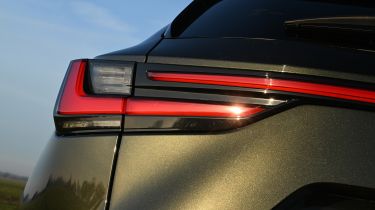Lexus NX review - MPG, running costs & CO2
"Lexus' first plug-in hybrid has an electric range of up to 40 miles"
Lexus has a long history of selling hybrid SUVs, and for the first time, Lexus has released a plug-in hybrid model. The former is cheaper to buy, offers diesel-rivalling efficiency, and will be a good solution for anyone without access to a home charger, or who often drives on the motorway. The plug-in hybrid will slash costs for company-car drivers thanks to its low CO2 emissions, but requires plugging in regularly to really benefit from zero-emissions driving on your local commute.
Lexus NX MPG & CO2
For the first time, Lexus has released a plug-in hybrid model. The NX 450h+ is fitted with an 18.1kWh battery, which requires charging using a home or public power supply. Using a home wallbox charger, it takes just under three hours (and the wallbox is well worth it, given a charge from a three-pin plug takes more than eight hours) and a full battery gives an electric range of up to 40 miles. In theory, this is enough to allow most drivers to tackle their commute without using any petrol. If you regularly use the electric power more than the petrol engine, you’ll enjoy very low running costs.
Official economy figures for the 450h+ are up to 313.8mpg, with CO2 emissions as low as 21g/km. The first figure is likely to be hard to match, and will depend entirely on how the car is driven and how often the battery is charged. Drive with the battery depleted and your economy figure will fall. But, unlike some PHEVs, the NX 450h+ acts as a regular hybrid once the battery is low on charge, so you still get decent fuel economy. Our test car, with a battery that wasn’t fully charged to begin with, returned an average of around 55mpg.
More reviews
The emissions figure is arguably more important for company-car drivers, because it puts the NX 450h+ in a low Benefit-in-Kind (BiK) band to make monthly bills more digestible. In fact, you’ll pay roughly a quarter of the hybrid’s BiK tax if you go for the plug-in hybrid.
The hybrid NX 350h has a more traditional powertrain for the brand, which recuperates energy as the car brakes and uses the petrol engine as a generator for a small battery when it gets low. Front-wheel drive models send around 240bhp to the front wheels between the engine and electric motor combined, while all-wheel drive versions get an additional 53bhp rear electric motor. Together the electric assistance makes life easier for the petrol engine and resulting in economy figures of up to 49.5mpg and as little as 129g/km of CO2.
It’s a good diesel alternative, and works particularly well around town, where the petrol engine may not need to run for a good proportion of stop-and-start journeys in traffic. The NX 350h is also cheaper to lease or buy (pricing starts at under £45,000, compared to £55,000 for the NX 450h+), and doesn’t require a home charger, so it suits owners with no off-street parking. Both the NX 450h+ and 350h are ULEZ exempt, but liable for the London Congestion Charge.
Insurance groups
The Lexus NX occupies slightly higher insurance groups than its predecessor, with a basic NX 350h beginning in group 32. This rises to a maximum of group 41 for an NX 450h+ in the most luxurious Takumi trim.
Warranty
While the NX initially comes with a three-year, 60,000-mile warranty, it can be extended to 10 years or 100,000 miles as you continue to have the car serviced at a Lexus main dealer. It’s called the Lexus Relax programme, and is more generous than any other of the ‘premium’ manufacturers. German brands tend to offer a three-year warranty, while the Hyundai Santa Fe and Kia Sorento hybrids come with five and seven years of cover respectively.
Servicing
Lexus dealers are often rated among the best by our readers, so you’ll be in good hands when your NX is due its first service. The NX also gets three years of roadside assistance included. While the new car is too new for any servicing data to be available, the old model needed servicing every 10,000 miles; an intermediate service is around £300 and a full service is roughly £500 or £600, depending on mileage.
Which Is Best?
Cheapest
- Name350h 2.5 Urban 5dr E-CVT 2WD
- Gearbox typeAuto
- RRP£44,615
Most Economical
- Name450h+ 2.5 Premium 5dr E-CVT
- Gearbox typeAuto
- RRP£50,725
Fastest
- Name450h+ 2.5 Premium 5dr E-CVT
- Gearbox typeAuto
- RRP£50,725













